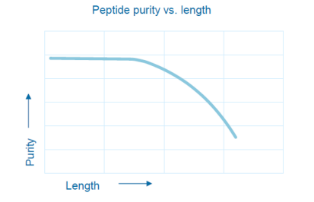When Omizzur receive an order for peptide synthesis, we will analyze the sequences of peptides to determine whether difficult to synthesize or exist water solubility problem. For some peptides with special sequences, our peptide specialist will give clients reasonable suggestions after careful analysis and research.These suggestions include peptide sequence optimization, etc. to meet the customer's requirements finally.
We list the types of peptide problems and ways to reduce or overcome them for customers' reference. Only through consultation with our technical experts, the design scheme of peptides can be finally determined.
1. Length is important
Generally speaking, the longer the peptide chain, the lower the purity of the crude peptide. Most peptides containing less than 50 amino residues are easier to synthesize. Reducing the length of peptide to less than 20 residues can achieve ideal results in most situations.

2. Beware of hydrophobic amino acids
If the sequence contains more than 50% hydrophobic residues, especially at the position 7-12 from the carboxyl end, the peptide will be difficult to synthesize.Replace non-essential hydrophobic residues with charged / polar residues or add hydrophilic residue can avoid peptide Insolubility.
Trp Ile Leu Phe Met Val Val | Replace with Add to | Glu Asp Arg His Gly Pro Lys |
3. Let peptide sequence be stable
The design of peptide sequence should consider its stability, including various factors that may appear in the production process and application process.Based on our over 10 years of synthetic experience, Omizzur peptide experts will assist you in sequence stability optimization to meet research demand.
| Relevant Stages | Stability Factor | Sequence Location | Optimization Strategy |
| Polypeptide Synthesis | Cyclization | • Asp-Gly • N-terminal Gln | • Asp replacement • Acetylation |
| Oxidation | • Cys • Met • Trp | • Cys with Ser • Met with Nle • Trp with Leu | |
| Hydrolysis | • Asp-Gly • Asp-Pro • Asp-Ser | • Asp replacement | |
| Secondary structure | Glu, Ile, Leu, Phe, Thr, Tyr, Val | • Cyclization • Amino acid substitution • Disulfide bridge | |
| Discoloration | Trp | • Trp replacement | |
| Peptidase Degradation | Exopeptidases Endopeptidases | Pro, Glu, Ser, Thr | • Cyclization • Acetylation • Amidation • D-amino acid |
| Peptide Assays | Glomerular filtration | • Hydrophilic peptides <25kDa | • PEG • PSA • HES • BSA |
4. Choose the suitable purity of peptide
Proper selection of peptide purity can meet your demand of life science research and reduce the cost of study meanwhile.In general the higher the purity level of peptide, the more reliable the experimental results are.Peptides with Low purity may cause toxicity or unnecessary side effects because of impurity remains,which we provide TFA removal and endotoxin removal services for that.
Based on the feedback from customers over the years, Omizzur can give the following suggestions for references:
| Purity(%) | Experiment Purpose |
| Crude(< 70%) | • Functional screening of drugs • Proteomics • Sequence Optimization |
| Immune (≥70%) | • ELISA • Antigenic determinant • Antigen synthesis and purification of polyclonal antibody |
| Biochemistry (≥85%) | • Western blot • Enzyme substrate study( qualitative) • Phosphorylation Study • Developing of polyclonal antibody |
| High purity (≥95%) | • NMR studies • Bioactivity test in vitro • Protein hydrolysis study • Ligand receptor interaction(quantitative) |
| Medical (≥98%) | • GMP drugs • SAR Research • Clinical study of drugs • QSAR Research |
Copyright © 2020 Omizzur Inc | Terms & Conditions | Privacy Notice | Sitemap